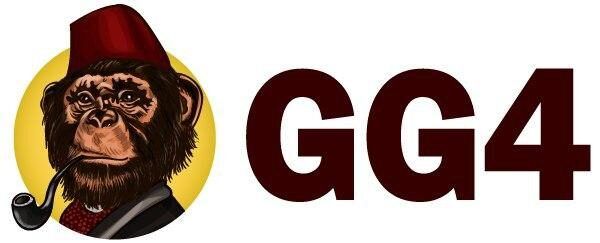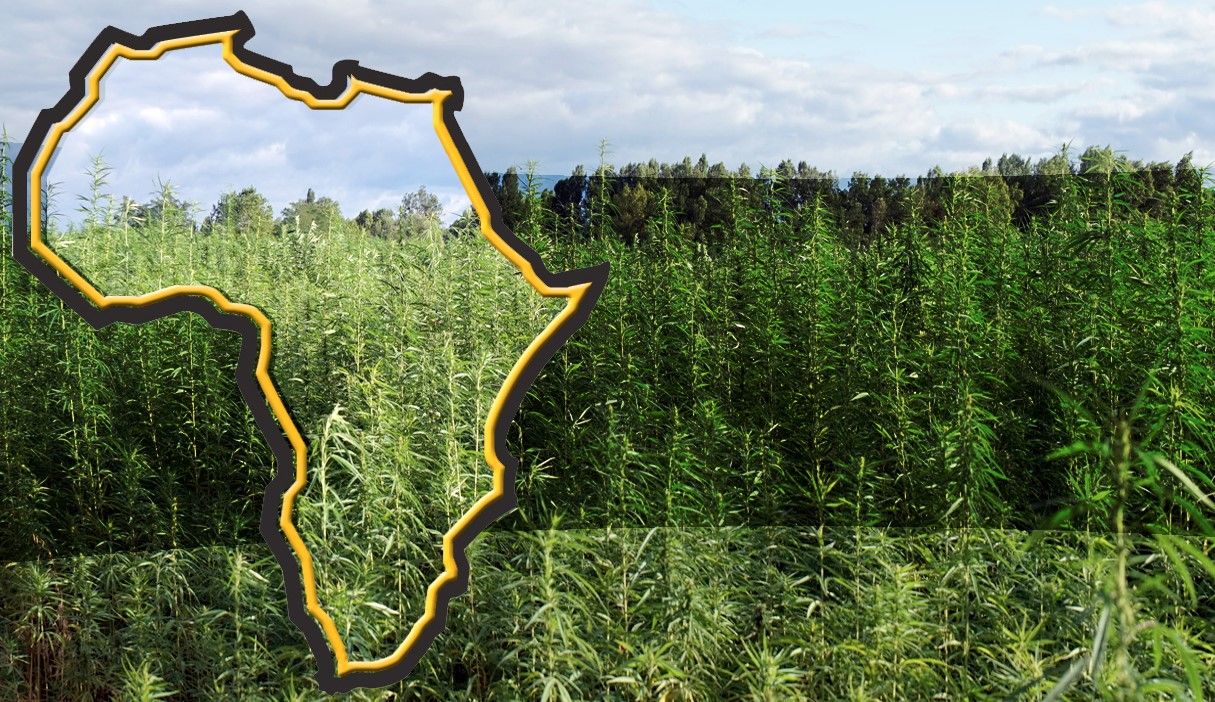The modern association of North Africa with marijuana is well known. However, the continent has a long and complicated history with this much-loved and much-disliked psychoactive plant. Some of it is documented, some was inferred from archaeological findings, and some is pure speculation. We dig into Africa’s lengthy connection with cannabis in this section
The roots of cannabis in Africa are diverse and enigmatic. What we do know is that cannabis has been in Africa for an extended period, though we’re unsure of when it first arrived.
Throughout Africa, there is clear evidence of cannabis usage in a wide range of civilizations. Cannabis use was banned in many African communities after European explorers arrived on the continent, but it did not totally destroy them. Over the centuries, Africa has produced and consumed copious amounts of cannabis, and it continues to do so today. African marijuana may one day be found on European store shelves.
When and Where Did Cannabis Arrive in Africa?
Although cannabis has had a long history in Africa, particularly Northern and Mediterranean Africa, the plant originally evolved in Asia before making its way west.
Although it is difficult to pinpoint an exact date, we know that cannabis was being cultivated in Africa at least 1,000 years ago. Some scant evidence from Egypt suggests the possibility that it may have arrived there up to 5,000 years ago. But such evidence is very sparse, so nothing can be certain. It seems most likely that the points of entry were Madagascar and Mediterranean North Africa. Cannabis in North Africa probably came both through Egypt and across the sea from elsewhere.
North African countries have records of cannabis use dating back further than other parts of the continent. In the 12th century, writers documented people smoking and eating cannabis for its psychoactive effects. Cannabis culture in Egypt and along the Red Sea was similar to that of nearby Levant cultures. But as you move west into the Maghreb region (Morocco, Algeria, and Tunisia), you find a unique culture with its own customs around cannabis use.
Although the public generally associates the area with hashish production, that is actually a recent development. In fact, research suggests that hashish was imported from Greece, Turkey, and Lebanon; there is no evidence ofhashish production in the Maghreb until 1921.
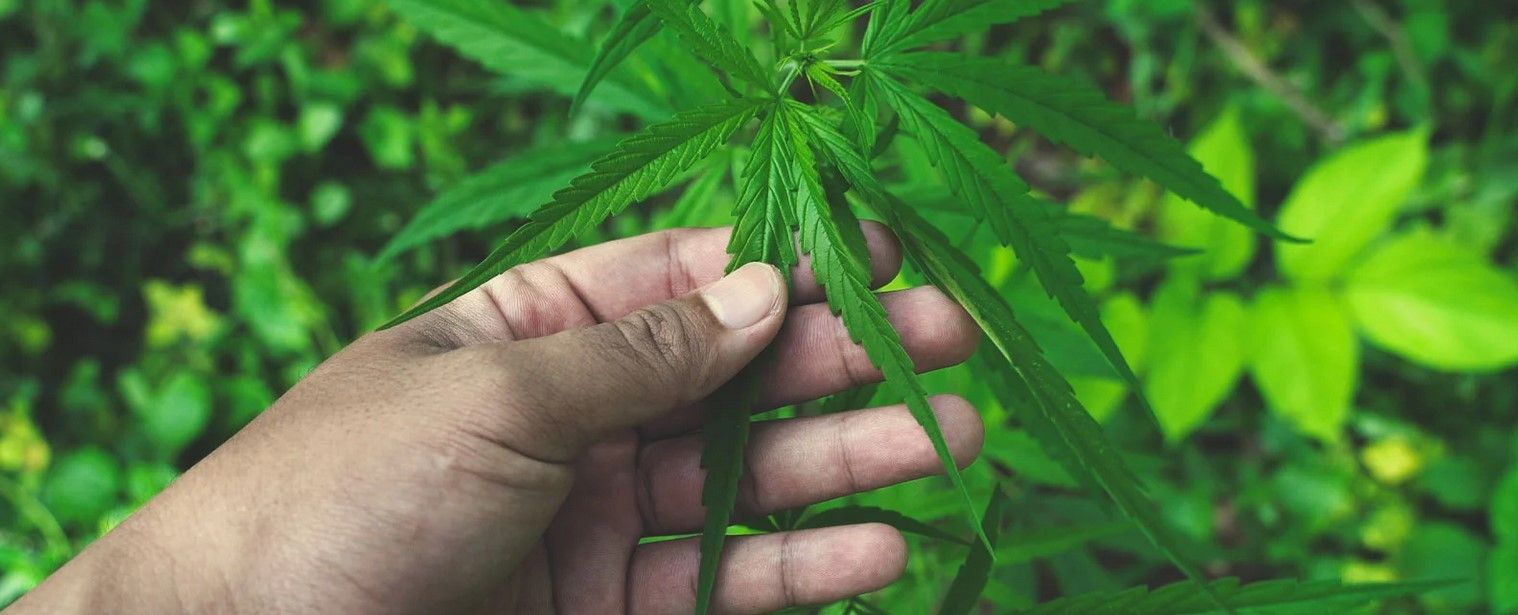
Tracing Cannabis Use Through Language
The history of cannabis in Africa becomes murkier as you go south of the Sahara. This is partly due to a lack of archaeological evidence, and partially because we have incorrect information from explorers. Their cannabis was frequently referred to as “African tobacco,” for example. Whether it was done on purpose to distinguish their own practice from that of native Africans or simply a misunderstanding about what they were consuming, it’s impossible to say. Fortunately, there’s no debate over what they meant.
The word “dagga” is used often to refer to cannabis in Southern Africa and is thus a useful term when it comes to tracking drug use in the region.
Dagga: An Etymological Journey
The origin of the term “dagga” is unclear, although it is thought to be derived from the Khoekhoe people of southern Africa (although its precise origins are unknown). It may refer to either a state of inebriation or Leonotis leonurus—a member of the mint family with serrated leaves that are similar to those of cannabis.
The first use of the word can be found in Jan van Riebeeck’s journal from 1658, where it was spelled as “daccha.”
It had already been used by various people when he recorded it, suggesting that it had spread across many cultures. Although this can’t tell us how long cannabis usage has been going on for, it does suggest that it must have been widely popular for a considerable length of time.
The origins of the word ‘cannabis’ will remain unknown due to the confusion between cannabis and Leonotis leonurus. They share a name and serrated leaves, but the flowers are different – only one causes a haut. It is unclear whether ‘cannabis’ referred originally to one or the other, or if it was applied wrongly at some point. This confusion has led scholars to propose different explanations.
Others believe it is not an African word, but rather a Dutch derivative of “tabak,” which means nothing about Africa’s pre-colonial cannabis use. The term comes from the Khoekhoe phrase for “tobacco.” It transforms into amaXa-b if prefixed with “!am,” the word for green, becoming green tobacco. This is how Brian tu Toit and Jean Branford think the term originated.
Who Used Cannabis in Africa?
Cannabis use has been fairly widespread in Africa, although it hasn’t been equally prevalent throughout the continent. Cannabis appears to have only recently arrived to parts of West Africa during the 20th century. But as we’ve seen, it’s been there for thousands of years in other regions of the continent.
Ancient Egypt
Because of its age, it is difficult to date cannabis use in Egypt precisely. For example, hemp ropes and textiles have been dated back to when the ancient Egyptians used them. It’s also possible that they widely used all of cannabis’ many cannabinoids. Shemshemet appears frequently in texts from ancient Egyptian times and is thought by many historians to refer to marijuana. Its applications varied greatly, from religious uses to medical remediation.’s unclear whether the Egyptians grew it or imported it themselves
The Khoekhoe
The Khoekhoe people of Southern Africa were already settled and had a focus on cattle farming by the time Dutch Boer settlers arrived. While first seen as friendly, over time the Boers began to encroach on their land, stealing resources and eventually enslaving them.
The Khoekhoe people are credited with van Riebeeck learning the term “dagga.” He saw that it was more valuable to them than gold, implying that it had significant importance in their society. They didn’t figure out how to smoke it until 1705. Previously, they had chewed it. In accordance with tradition, other African communities quickly adopted it.
The Zulus
Although some colonists bemoaned cannabis’s sedative effects on native Africans, this does not give the full picture. We do not know for certain, but it is thought that (according to AT Bryant) the fierce Zulu people used cannabis before battle. However, we have few records confirming this so take this information with a grain of salt.
The Bashilange
Supposedly a violent people, the Bashilange went through a quick and sizable cultural change after they found cannabis–or “riamba”. In fact, Wissmann states that they even changed their name to Ben-Riamba, which translates to “from hemp”. Every night, the village would have smoking ceremonies involving cannabis. However, on more special days there was an increased indulgence. Even punishment revolved around having to smoke cannabis. If someone broke a rule, they had to smoke cannabis as punishment until they passed out. If they committed a grave offense, in addition to smoking, they also had to pay the victim of their crime salt as compensation. However, due to changes in cultural norms and values at the time, people began disregarding traditional hierarchies. The villages that used to be under the Bashilange’s control (and paid taxes) refused to continue paying since the Bashilange no longer held any power over them. This resulted in an uprising. The royal family was accused of being sorcerers and given a sentence to trial by smoking cannabis. Once they passed out, some of the villagers attempted to assassinate them. Others intervened and stopped the rebels who then fled only return later without facing punishment.. Despite The failed assassination attempt, their days were numbered .The family were soon deposedand the riamba cult ended., However, many practices were retained, includeing lighter punishments for crimes.
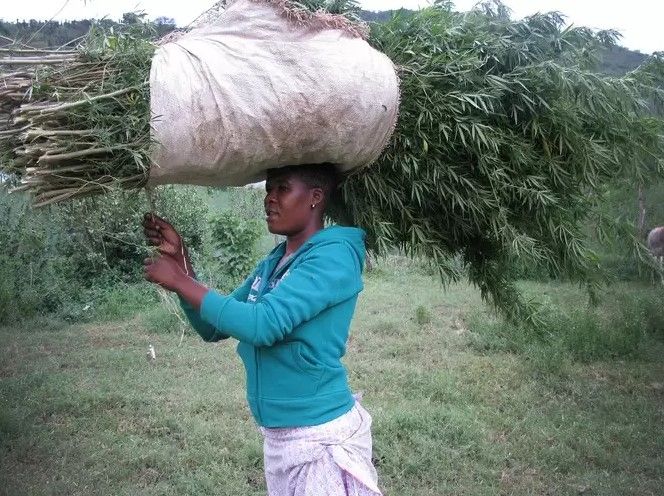
Cannabis in Colonial Africa
Many of the cannabis records in sub-Saharan Africa come from Europeans. Cannabis growth and usage were initially permitted (if not encouraged). In many parts of colonial Africa, cannabis was even legal from the 1870s through the 1890s. However, as time progressed, cannabis use became less and less acceptable.
Colonial Views on Cannabis Consumption
The colonists started to oppose the use of cannabis by natives because they believed it made them lazy, and less productive. As Henry M Stanley said:
The almost universal practice of violently breathing in the smoke of Cannabis sativa or wild hemp is extremely harmful to one’s physical abilities. These people, whose lungs and vital organs have been damaged by continuous abuse of these hazardous behaviors, find that they have no physical stamina when the thermometer rises to 140 Fahr. in the sun. When taking a journey in a heavily loaded caravan, the souche of the exercise soon shows on their debilitated abilities, and they one by one fall out of the ranks, exposing their impotence and disabilities.
Others regarded the use of cannabis as a sinful, anti-Christian practice. As a result, many missionaries began to feel that suppressing this aspect of African cultures was critical to saving their ganja-addicted souls.
Cultivating cannabis was primarily done to export the product to Europe where it was used for its fibers.
The Prohibition of Cannabis in Africa
In the West, many colonies chose to criminalize cannabis in 1890. Nevertheless, it wasn’t until politics happening on the other side of the Atlantic occurred that a complete ban on cannabis finally took place in Africa. With the Escalating fears concerning marijuana use in America, there were international attempts to outlaw it. This was only the beginning of The war against drugs.
In 1925, the League of Nations agreed to ban cannabis as part of the Geneva Opium Convention.
The Growth of Illegal Cannabis Markets
Despite the illegality of marijuana in many areas, people continue to grow and smoke it, Africa included.
Even before cannabis was illegal, people were slowly turning against it. More and more people began to hide their cultivation and consumption of the plant. Soon enough, what was once a normal thing to do became something that only those at the bottom of society did.
Returning to the term marijuana is an excellent illustration of how cannabis has been outlawed in Africa. In Afrikaans, the suffix “-ga” denotes something evil or unpleasant. As a result, the National Party of South Africa began using it pejoratively to describe the word dagga. Many pro-cannabis advocates still avoid using the term dagga today because of this.
Even though there is a growing anti-cannabis attitude throughout Africa, illicit cultivation persists on an enormous scale. It was and still is the world’s largest exporter of illegally cultivated marijuana because it was until recently legal in Morocco.
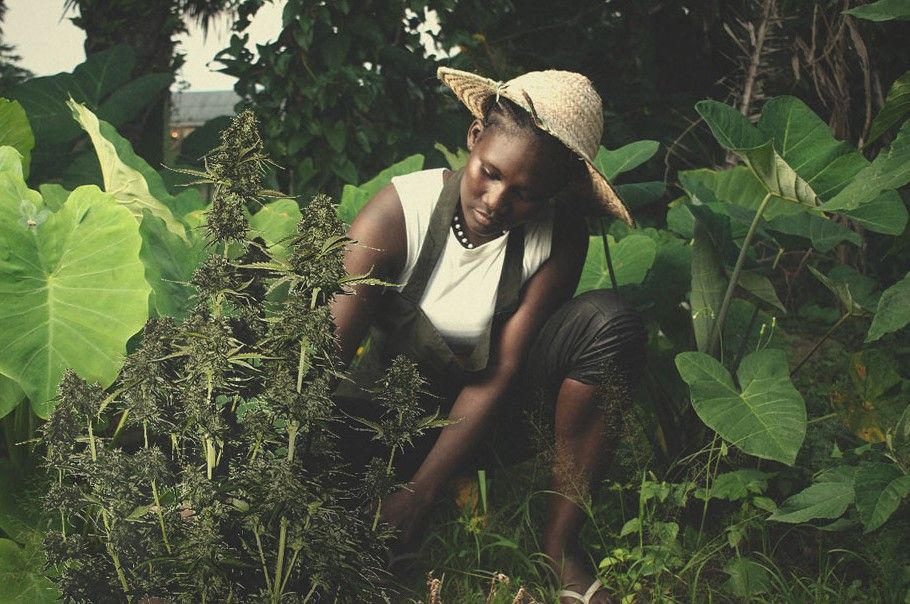
Cannabis, the Slave Trade, and the Origin of “Marijuana”
Given that cannabis was used for psychotropic purposes in Africa before it was introduced to Europe and the Americas, it’s conceivable that it was carried there by African slaves. Over 10 million people were enslaved in Africa and taken across the Atlantic Ocean. Many of these individuals would have come from regions where cultivating and using cannabis were common.
The point is that the term “marijuana” was likely brought over by African slaves, or picked up by Europeans in Africa and carried to the Americas. What we believe we do know, however, is that the word “marijuana” arrived with the slaves.
The term “riamba” refers to cannabis, and the prefix “ma” pluralizes something, making it “mariamba.” Eventually, mariamba turned into “mariguana” in Mexico before moving north and becoming known as “marihuana,” and finally just simply marijuana.
Marijuana in Modern Africa
Cannabis has been cultivated on a large scale across Africa for more than a millennium. The north of the continent, especially Morocco, is famous for producing some of the finest hashish in the world. However, hashish production in North Africa is just 100 years old, and it has only recently exploded in recent history.
After the global market crash in the 80s, more farmers in Africa began to grow cannabis illegally. But as time went on, different governments realised that they could make money by legalising and selling cannabis. This shift from illegal to legal production is still happening today.
Cannabis Legalization in Africa
So far, nine African countries have legalized cannabis and more are considering it. These nations are South Africa, Uganda, Zimbabwe, Zambia, Lesotho, the Democratic Republic of Congo, Malawi, Eswatini and Morocco.
The legalization of cannabis in the United States and Canada was a major factor in prompting these changes. Which raises its own set of issues. Duvall characterizes much of this trend as neo-colonialism. This is due, at least in part, to the fact that many of these regulations necessitate licenses and money that may only be obtained by larger businesses from the North Global World. Neo-colonialism, or what Duvall refers to as “canna-colonization,” is prevalent in six out of the nine nations he studied (57 percent).
The problem is not with cannabis legalization, but rather in ensuring that locals are unable to profit from legal cannabis production. As a result, its profits can’t be earned domestically.
The Future of Cannabis in Africa
It seems that Africa will produce more marijuana in the future, but it’s hard to know what this entails and if neo-colonialism is just a phase or something deeper rooted.
Africa has had a long, complicated relationship with cannabis that is not ending any time soon and may be entering another phase.
